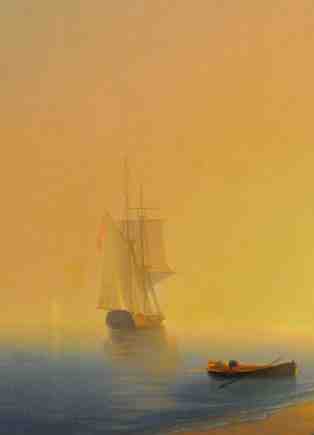'The Sail' is an enigmatic little poem by Mikhail Lermontov (1814-1841) that is simple only on the surface. {1} Ostensibly the sail stands for Lermontov's independent life, {2} where his principled stand for free speech in Russia earned him two periods of exile to the Caucasus. Here he was to find his vocation as a serving officer, though in the last journey out, at the spa town of Pyatigorsk, he also managed to quarrel with a school-friend over the same lady, in an offensive manner, for which he was called out and killed in a duel.

The poem has no line run-on, no striking metaphors, and nothing particularly difficult
in vocabulary and syntax. It has, nonetheless, occasioned a great deal of scholarly comment. {1}
Парус
Белеет парус одинокой
В тумане моря голубом!..
Что ищет он в стране далекой?
Что кинул он в краю родном?..
Играют волны — ветер свищет,
И мачта гнется и скрыпит...
Увы! он счастия не ищет,
И не от счастия бежит!
Под ним струя светлей лазури,
Над ним луч солнца золотой...
А он, мятежный, просит бури,
Как будто в бурях есть покой!
1832
The TTS (text to speech) recording is:
The poem is in iambics, rhymed AbAb:
Беле́ет па́рус одино́кой u-u-u-u-u 4A
В тума́не мо́ря́ голубо́м!.. u-u-u-u- 4b
Что и́щет он в стране́ далёкой? u-u-u-u-u 4A
Что ки́нул он в краю́ родно́м?.. u-u-u-u- 4b
The meaning is also straightforward; machine code translation is:
Sail
The white sail is lonely
In the fog of the blue sea! ..
what is he looking for in a distant country?
What did he throw in his native land?..
Waves are playing — the wind is whistling,
And the mast bends and creaks...
alas! he is not looking for happiness,
And he's not running from happiness!
Under it, the jet is lighter than azure,
Above him is a golden ray of the sun...
And he, rebellious, asks for a storm,
As if there is peace in storms!
But, as Michael Wachtel points out, this surface simplicity is deceptive. {1} Each stanza
consists of a two-line description followed by ellipsis and two-line interpretation.
There is also a slow build up in emotion: the first stanza ends with a question, the second with a statement, and the
third with an exclamation.
The interpretation of the first stanza is not unreasonable, but the second stanza brings problems. Though the sail is apparently
far away, we can hear the mast creak. The interpretation does not follow from the description, moreover, so that the sail has become a symbol, not only
for the entire ship (synecdoche) but humanity itself. In the third stanza we have the unlikely images of blue and sun in the misted blue, and then, in no way connected
with the images, the rebellious poet seeking peace among storms. Here, of course, is Lermontov's persona, one further developed in the not wholly attractive portrait of Pechorin in 'A Hero of Our Time'. Lermontov's
Romanticism is beginning to open the fissures that underlie our current Modernism.
The piece has been extensively translated:
Ruverses have no less than 15 versions, of which Robert Chandler's
may be the best:
White sail out in the bay
billowing in the wind.
Why sail so far away?
Why leave so much behind?
Winds must play on the seas
and masts creak in the wind.
Fortune is not what he seeks,
nor what he's left behind.
A golden light still pours
down onto deep blue seas;
this rebel, alas, seeks storms,
as if in storms lies peace.
Lyrics Translate have some 18 versions.
The practical importance of this analysis? Respect the enigmatic structure and keep
the diction exceptionally simple:
The Sail
The white sail finds itself alone,
throughout long miles of misted blue. . .
To what far country is it blown?
Why leave the native lands it knew?
The mast heaves, the wind shrieks;
the waves are at their usual game. . .
Alas! not happiness it seeks,
but neither will it flee the same.
Below: a stream of brilliant blue:
above: a flood of golden sun. . .
The storms to which it means to hew
are peace to this rebellious one.
1. Wachtel, M. The Cambridge Introduction to Russian Poetry (CUP 2004) 113-5.
2. Mirsky, D.S. A History of Russian Literature (Knopf 1926/Vintage 1958) 136-44.
Russian poem translations on this site: listing.